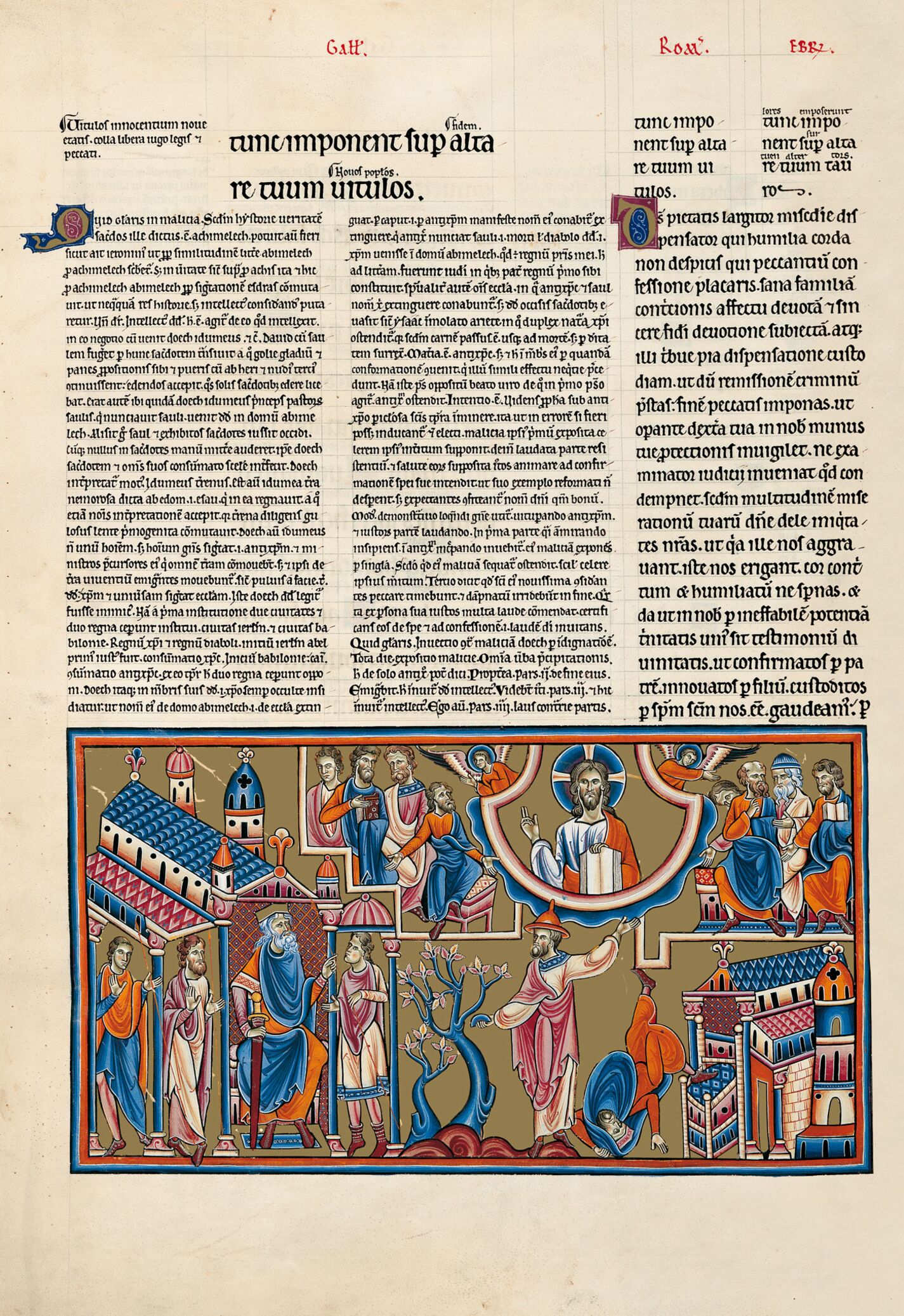The psalm is about the punishment of those who are malicious and do wicked things, and the punishment which will be due to them, in contrast with the mercy that God shows to the just. As in the case of the previous psalm, the title (When Doeg the Edomite came and told Saul) explains some of the imagery which is taken from the story of Doeg and Saul as an example of malice and evil. At the top a bust of God, between angels, holds an open book and blesses. On either side are four seated men in discussion, with the angels gesturing toward them (v. 8, Videbunt iusti et timebunt // The just shall see and fear). Below God, the psalmist, wearing a pointed cap, stands by an olive tree (v. 10, Ego autem sicut oliva fructifera in domo DeI: speravi in misericordia Dei in aeternum // But I, as a fruitful olive in the house of God, have hoped in the mercy of God for ever) looking towards Saul, with one hand pointing up to God and the other holding out a knife blade towards the tree (v. 4, Sivut novacula acuta fecisti dolum // as a sharp razor you have wrought deceit). Beside him a king falls upside down in front of his throne placed at the entrance to a palace (v. 7, Propterea Deus destruet te in finem. Evellet te, et emigrabit te de tabernaculo // Therefore will God destroy you for ever. He will pluck you out, and remove you from your dwelling place). At the bottom left, Saul, holding a sword, sits enthroned in his palace with two of his councillors behind him, as Doeg the Edomite comes before him (1 Sm. 22: 9-10) to tell him that David had visited the priest, Achimelech, who had given him food and the sword of Goliath.

The psalm is about the punishment of those who are malicious and do wicked things, and the punishment which will be due to them, in contrast with the mercy that God shows to the just. As in the case of the previous psalm, the title (When Doeg the Edomite came and told Saul) explains some of the imagery which is taken from the story of Doeg and Saul as an example of malice and evil. At the top a bust of God, between angels, holds an open book and blesses. On either side are four seated men in discussion, with the angels gesturing toward them (v. 8, Videbunt iusti et timebunt // The just shall see and fear). Below God, the psalmist, wearing a pointed cap, stands by an olive tree (v. 10, Ego autem sicut oliva fructifera in domo DeI: speravi in misericordia Dei in aeternum // But I, as a fruitful olive in the house of God, have hoped in the mercy of God for ever) looking towards Saul, with one hand pointing up to God and the other holding out a knife blade towards the tree (v. 4, Sivut novacula acuta fecisti dolum // as a sharp razor you have wrought deceit). Beside him a king falls upside down in front of his throne placed at the entrance to a palace (v. 7, Propterea Deus destruet te in finem. Evellet te, et emigrabit te de tabernaculo // Therefore will God destroy you for ever. He will pluck you out, and remove you from your dwelling place). At the bottom left, Saul, holding a sword, sits enthroned in his palace with two of his councillors behind him, as Doeg the Edomite comes before him (1 Sm. 22: 9-10) to tell him that David had visited the priest, Achimelech, who had given him food and the sword of Goliath.